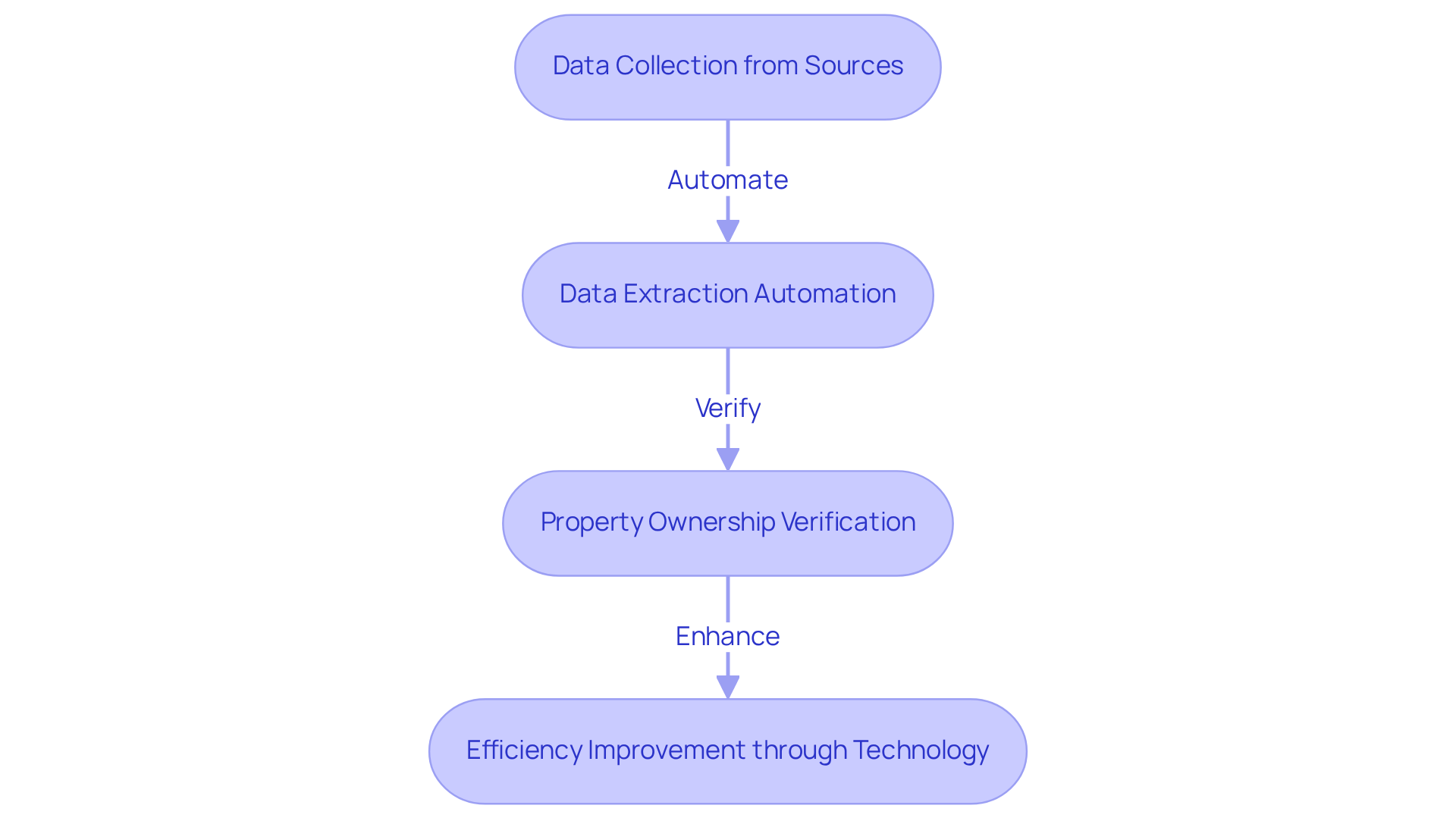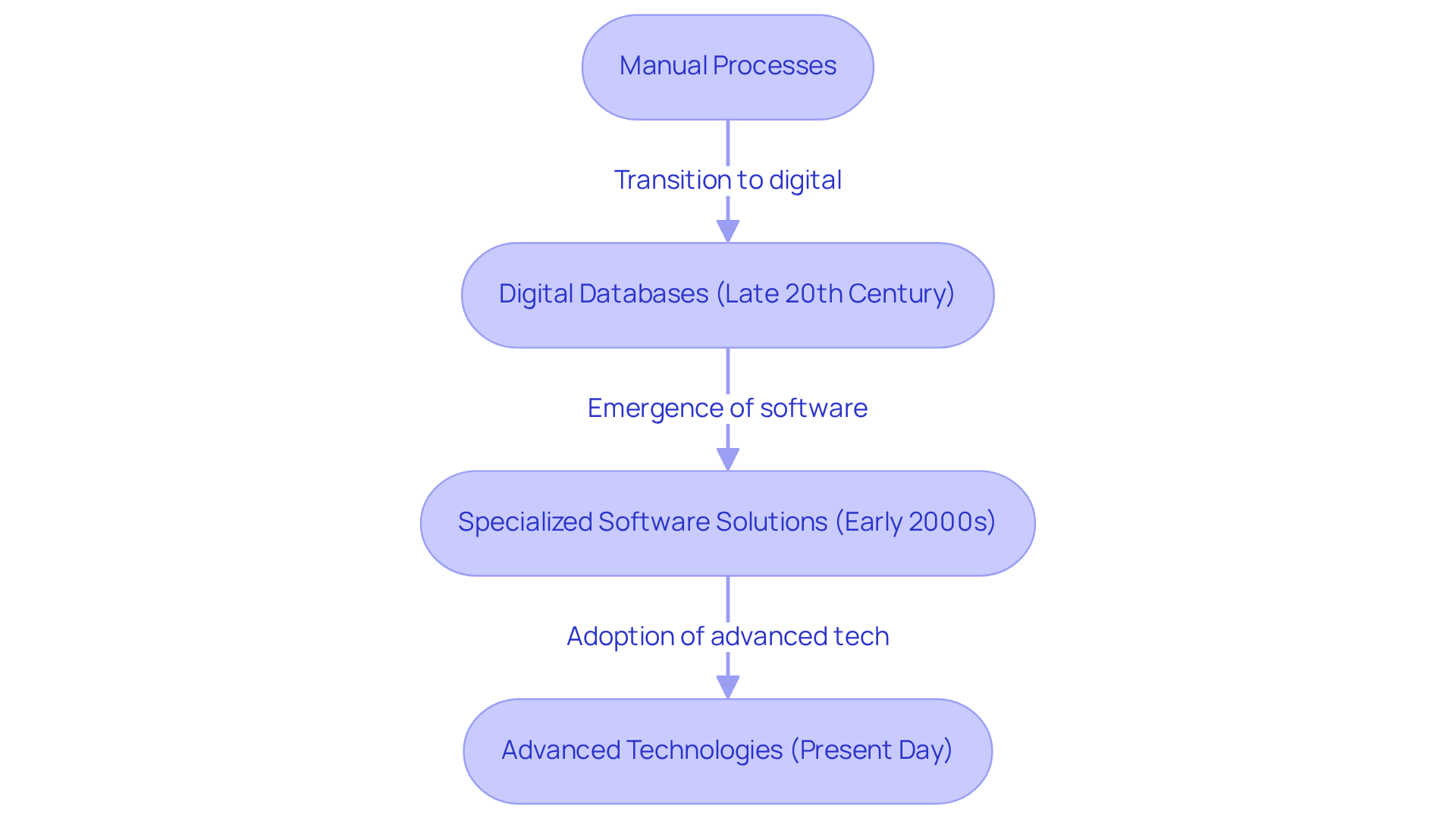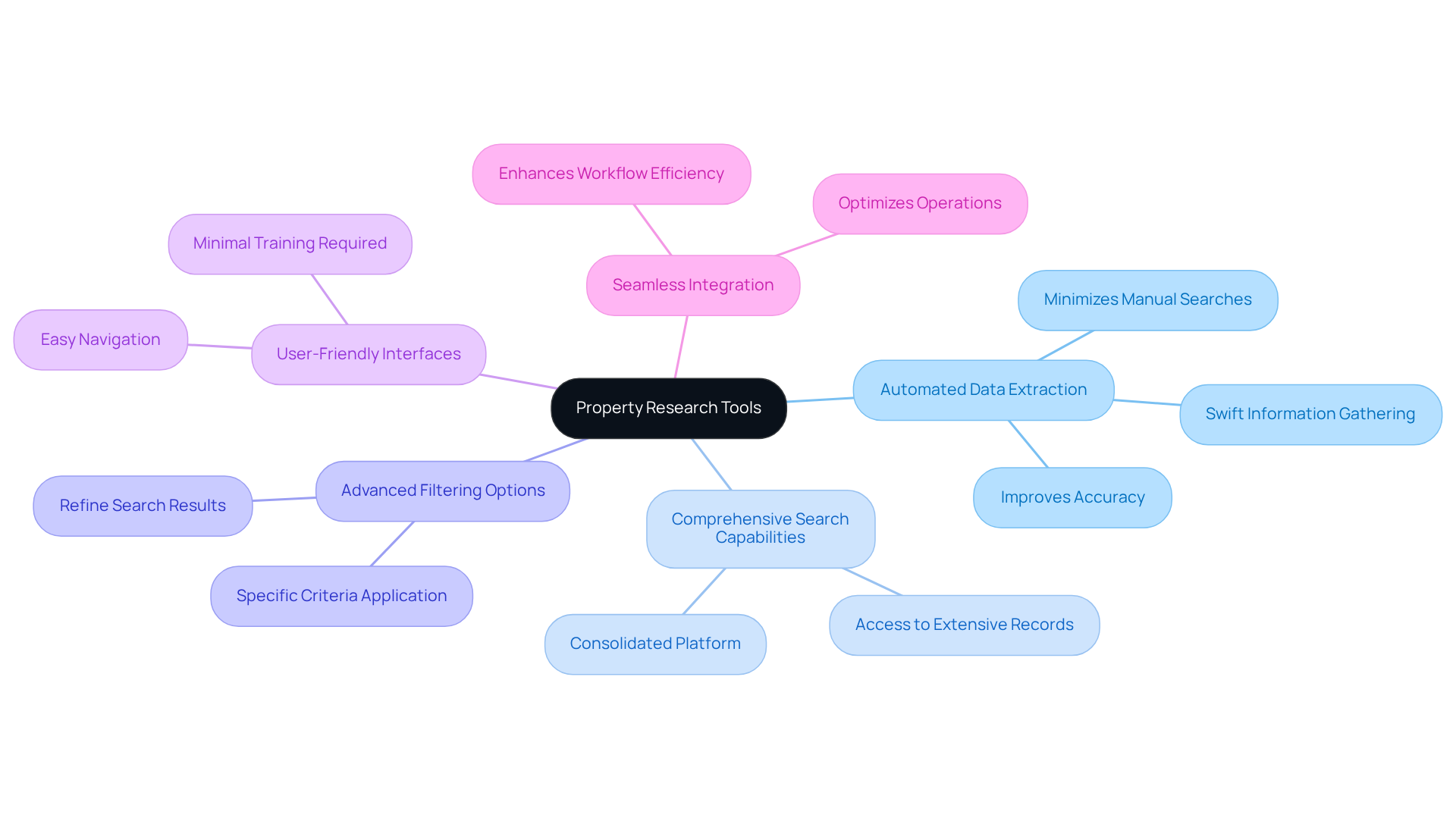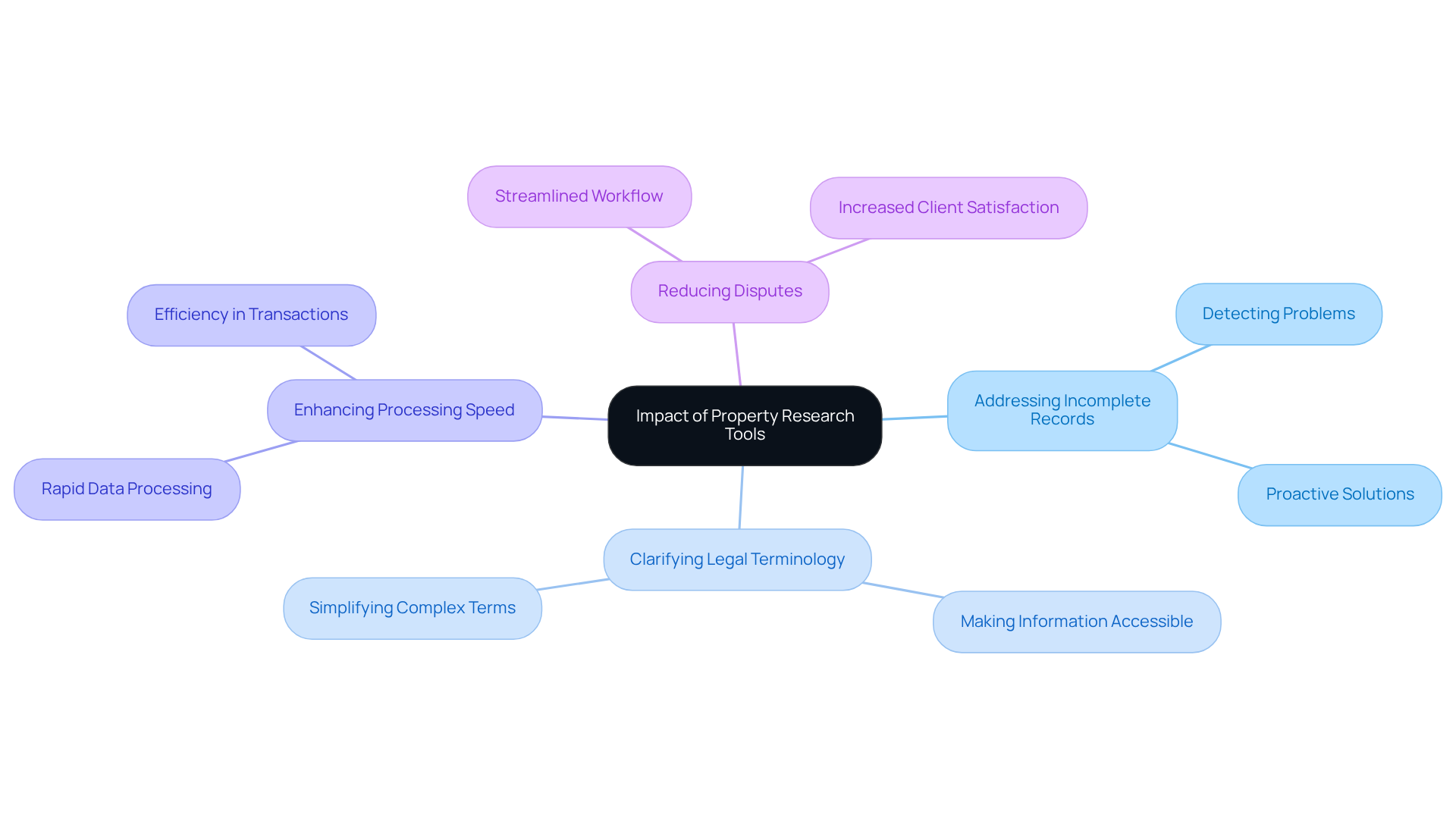Overview
Property research tools represent specialized software that streamlines the collection and analysis of property ownership data, significantly enhancing both the efficiency and accuracy of title research. Their importance is underscored through features such as:
- Automated data extraction
- Comprehensive search capabilities
Collectively, these elements reduce manual effort and errors, ultimately transforming the real estate landscape. Consequently, the adoption of these tools not only mitigates challenges but also empowers professionals in the field to conduct more reliable and effective research.
Introduction
The landscape of real estate is rapidly evolving, propelled by the imperative for efficiency and accuracy in property ownership verification. Property research tools have emerged as indispensable allies for professionals in this domain, automating the collection and analysis of critical data from diverse sources. Yet, as these tools advance in sophistication, one must consider: how do they genuinely enhance the title research process and tackle the challenges posed by incomplete records and intricate legal jargon? An exploration of the features and functionalities of these innovative resources reveals their transformative impact on the industry, underscoring their role in streamlining workflows and enhancing decision-making.
Define Property Research Tools and Their Role in Title Research
Real estate analysis applications represent specialized software programs designed to assist professionals in the collection, examination, and management of data related to property ownership and history. These tools raise the question of what are property research tools, as they streamline the process of ownership research by automating data extraction from diverse sources, including public records, ownership documents, and legal filings. Their primary function is to facilitate the verification of property ownership, ensuring that all pertinent information is accurate and current.
Furthermore, by leveraging advanced technologies such as machine learning and optical character recognition, these resources significantly reduce the time and effort required to conduct property searches, highlighting what are property research tools that are indispensable for researchers and real estate professionals alike. For instance, Parse AI exemplifies this innovation by enabling researchers to complete abstracts and reports more swiftly and accurately, resulting in substantial cost savings compared to traditional methods.
With the , the importance of these resources in ensuring efficient ownership verification is paramount. As Rodney Good, Manager II for Casualty and Title Financial Analysis, asserts, "The incorporation of sophisticated asset examination instruments is essential for improving efficiency and precision in document evaluation, ultimately benefiting all parties involved in the real estate industry.

Trace the Evolution of Property Research Tools in Real Estate
The evolution of asset research tools raises the question of what are property research tools, as it has significantly transformed the real estate landscape from labor-intensive manual processes to sophisticated digital solutions.
For decades, title researchers relied on physical records and manual searches, which were not only time-consuming but also prone to human error. The late 20th century marked a pivotal shift with the emergence of digital databases, facilitating a transition to electronic record-keeping. By the early 2000s, the introduction of specialized software solutions further revolutionized the industry, providing quicker access to real estate records and enhancing data management capabilities.
Today, such as machine learning and optical character recognition are leading efforts in real estate analysis, which raises the question of what are property research tools that enable professionals to extract and examine extensive datasets with remarkable speed and precision. This evolution underscores the industry's commitment to enhancing efficiency and precision in title examination, ultimately benefiting all parties involved.
As John D. Rockefeller astutely observed, 'The significant wealth in America has been generated through land,' highlighting the essential role of efficient property evaluation instruments in seizing these opportunities.
Furthermore, Parse AI's partnership with land service experts exemplifies a commitment to ongoing enhancement, ensuring that resources evolve in line with the sector's demands.

Identify Key Features and Functionalities of Property Research Tools
What are property research tools that have several essential attributes which significantly enhance the effectiveness of ownership examination?
- Automated data extraction emerges as a pivotal functionality, allowing users to swiftly gather information from various sources and thus minimizing the time spent on manual searches. This capability not only accelerates the research process but also improves accuracy by mitigating human error.
- Comprehensive search capabilities represent another vital feature, enabling title researchers to understand what are property research tools that allow access to an extensive array of real estate records, including deeds, liens, and tax assessments, all consolidated in a single platform.
- Advanced filtering options further empower users to refine their search results based on specific criteria, ensuring they quickly find the most relevant information.
- are crucial for real estate professionals to understand what are property research tools, as they facilitate easy navigation of the software without the necessity for extensive training. This accessibility is paramount in a fast-paced industry where time is of the essence.
- Furthermore, seamless integration with other real estate platforms enhances overall workflow efficiency, rendering these resources indispensable for professionals aiming to optimize their operations.
Statistics indicate that 90% of users express high satisfaction with the interfaces of property analysis resources, underscoring their effectiveness in meeting the needs of real estate professionals. As Fiona Sigalla noted, "Real estate investment is certainly a vote of confidence on future activity," emphasizing the importance of reliable tools for informed decision-making.
Moreover, Parse AI illustrates how machine learning and optical character recognition can enhance the document investigation process, offering substantial cost reductions and efficiency gains. Overall, these functionalities not only enhance the speed and precision of document examination but also contribute to a more productive and enjoyable user experience.

Examine the Impact of Property Research Tools on Title Research Challenges
Property analysis resources fundamentally transform the landscape of ownership research by effectively addressing the challenges posed by incomplete or inconsistent ownership records. Such inconsistencies can lead to conflicts and setbacks in real estate dealings. However, advanced algorithms within these systems promptly detect and highlight potential problems, enabling researchers to tackle them proactively.
The complexity of legal terminology in documents often impedes precise understanding; nevertheless, many contemporary resources provide features that clarify this jargon, making essential information more accessible. Furthermore, the rapid processing capabilities of these resources empower researchers to accomplish their assignments more efficiently, ultimately reducing the time required for real estate transactions and enhancing client satisfaction.
As one researcher noted, "The incorporation of technology has not only streamlined our workflow but has also considerably decreased the number of disputes we face." This observation underscores a broader trend where what are are increasingly acknowledged for their role in enhancing accuracy and reliability in title searches.

Conclusion
The significance of property research tools in the real estate sector is paramount. These innovative solutions have fundamentally transformed how professionals conduct ownership research, streamlining processes that were once labor-intensive and susceptible to error. By automating data extraction and leveraging advanced technologies, property research tools enhance the accuracy and efficiency of title research, making them indispensable in today's real estate landscape.
This article explored key features of these tools, including:
- Automated data extraction
- Comprehensive search capabilities
- User-friendly interfaces
The evolution of property research technology has led to substantial improvements in how real estate professionals navigate complex ownership records, ultimately reducing the time and effort required for precise assessments. Furthermore, the integration of machine learning and optical character recognition has revolutionized document investigation, yielding significant cost savings and boosting overall productivity.
In light of these advancements, it is crucial for real estate professionals to embrace the capabilities of modern property research tools. As the industry continues to evolve, staying informed about the latest technologies and their functionalities will empower professionals to make informed decisions, mitigate risks, and enhance client satisfaction. The future of property research is indeed promising, and leveraging these tools will undoubtedly result in more efficient and reliable outcomes in title research.
Frequently Asked Questions
What are property research tools?
Property research tools are specialized software programs designed to assist professionals in collecting, examining, and managing data related to property ownership and history.
How do property research tools assist in title research?
These tools streamline the process of ownership research by automating data extraction from various sources, including public records, ownership documents, and legal filings.
What is the primary function of property research tools?
Their primary function is to facilitate the verification of property ownership, ensuring that all pertinent information is accurate and current.
What technologies do property research tools leverage to enhance their functionality?
They leverage advanced technologies such as machine learning and optical character recognition to significantly reduce the time and effort required to conduct property searches.
Can you provide an example of a property research tool?
Parse AI is an example of a property research tool that enables researchers to complete abstracts and reports more swiftly and accurately, resulting in substantial cost savings compared to traditional methods.
What is the projected growth of the prop-tech market?
The prop-tech market is projected to reach USD 32.2 billion by 2030.
Why are property research tools important in the real estate industry?
They are essential for ensuring efficient ownership verification and improving efficiency and precision in document evaluation, ultimately benefiting all parties involved in the real estate industry.




